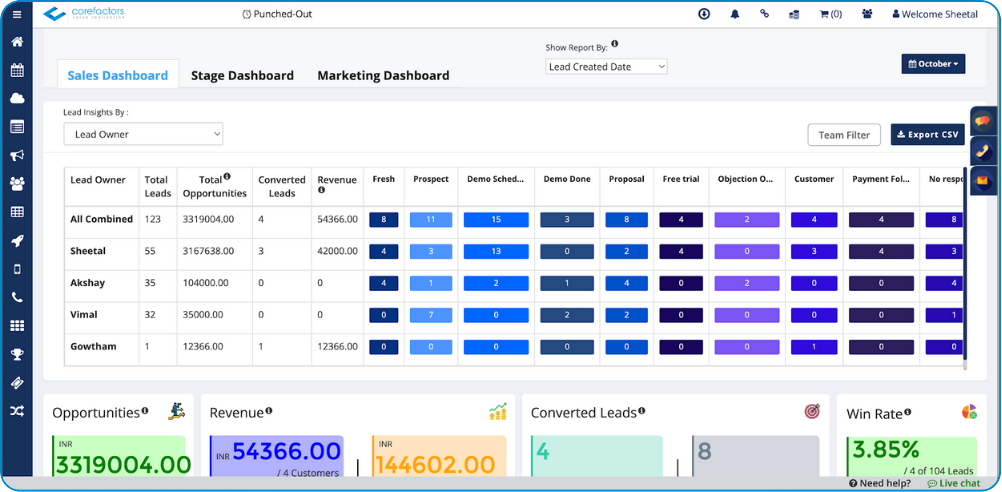CRM is everywhere in today's business conversations, but its true potential remains untapped by many. Beyond the surface-level benefits of automated tasks and streamlined contact management, the real power of CRM lies in its ability to fundamentally transform sales productivity and performance beyond conventional expectations.
This blog delves into the often-overlooked CRM impact, uncovering how it can redefine sales outcomes in ways that surpass traditional expectations.
Understanding CRM Potential
Initially designed to manage customer information and automate routine tasks, CRM systems have evolved into vital platforms that seamlessly integrate marketing, customer service, and sales functions. This integration streamlines processes while providing deep, data-driven insights that empower businesses to anticipate customer needs, personalize interactions, and drive sales precisely.
By aligning sales strategies with overall business goals, the CRM impact becomes evident, as it propels sales teams from reactive to proactive, significantly boosting productivity and performance.
The CRM impact lies in its ability to uncover hidden opportunities and elevate sales outcomes beyond conventional methods. Equipped with predictive analytics, sophisticated customer segmentation, and automation of complex sales processes, CRM provides the tools sales teams need to thrive in today’s competitive environment. It revolutionizes business approaches to sales, enabling quicker deal closures, stronger customer relationships, and sustained growth.
Here are key CRM features and capabilities that can significantly enhance sales productivity and performance:
CRM impact on Sales Productivity and Performance
Let's have a look at the features of a CRM system that have a positive impact on sales productivity and performance.
- Centralizing Information and Synergizing Departments
Sales is rarely a one-person show. It is inherently collaborative, involving various departments like marketing, customer service, and product development. CRM as a unified repository, breaks down information silos to ensure every department has access to consistent and actionable data and all the stakeholders operate from a single, cohesive narrative.
This single source of truth transforms how teams engage with one another. Marketing strategies become more precisely aligned with sales objectives, enabling campaigns that are not only targeted but also timely and relevant. Customer service teams gain access to comprehensive context, enhancing their ability to resolve issues with greater efficacy. Sales professionals, in turn, benefit from integrated insights across departments, allowing for a more informed and strategic approach to closing deals.
This symbiotic flow of information cultivates a collaborative culture, where each team’s contributions are synergistically leveraged, culminating in superior sales performance and organizational cohesion.
2. Improved Customer Retention
Acquiring new customers is important, but retaining existing ones is even more crucial. CRM systems play a pivotal role in improving customer retention by enabling sales teams to maintain strong relationships with clients. With a CRM, sales reps have access to a complete history of customer interactions, allowing them to anticipate needs and proactively address concerns.
For example, a CRM system can alert a sales rep when a long-term customer is due for a product upgrade or when their contract is about to expire. By reaching out at the right time with the right offer, sales teams can prevent churn and increase customer lifetime value. This proactive approach boosts sales performance and strengthens the overall customer relationship.
3. The Art of Anticipation
CRM systems go beyond mere data repositories and apply the art of anticipation. By analyzing customer data, sales teams can predict future behaviors, needs, and pain points, allowing them to engage with customers proactively. This predictive capability is a game-changer in sales productivity and performance.
For instance, CRM systems can flag patterns in a customer’s purchase history that may indicate readiness for an upsell or cross-sell. This allows sales teams to approach the customer with tailored offers at precisely the right moment, significantly increasing the chances of conversion.
4. Social CRM for Sales Amplification
Another underappreciated aspect of the CRM impact is their ability to integrate with social media platforms, a feature known as Social CRM. This integration enables sales teams to monitor customer sentiments, track brand mentions, and engage with prospects directly through social channels. Social CRM turns social media from a marketing tool into a powerful sales amplification channel.
Sales teams can leverage social listening tools within CRM systems to identify leads based on online behavior, such as comments, likes, and shares. These insights enable sales reps to initiate conversations that are highly relevant and timely, thereby increasing the likelihood of a successful outcome. According to a report by LinkedIn, 78% of social sellers outsell peers who don’t use social media, showcasing the importance of integrating social strategies within CRM.
Check out more on the best social selling techniques to enhance your strategy.
5. Moving Sales from Transactions to Interactions
CRM systems shift the sales approach from transactional to relational, a subtle but critical shift that impacts long-term sales performance. Instead of focusing solely on closing deals, CRM systems encourage sales teams to nurture relationships by maintaining ongoing, meaningful interactions with customers. This approach leads to higher customer retention rates and increased lifetime value.
By providing a 360-degree view of each customer, CRM systems allow sales reps to engage in personalized interactions that resonate on a deeper level. This is particularly important in complex B2B sales environments where relationships often determine the outcome of deals.
6. Agile Sales Strategies through CRM
In a changing business environment, agility is key. CRM systems empower sales teams to adapt in real time to market shifts, customer needs, and competitive pressures. This agility is often underpinned by CRM features such as real-time data analytics, automated reporting, and AI-driven insights.
For example, if a sales rep notices a sudden drop in customer engagement, the CRM system can instantly provide insights into possible reasons, such as changes in buying behavior or emerging competitor activity.
Armed with this information, the sales team can pivot their strategy, perhaps by adjusting their messaging or offering new incentives. This ability to quickly adapt ensures that sales efforts remain aligned with current market dynamics, driving better performance outcomes.
7. Automating the Mundane
While automation in CRM is often touted for its ability to save time, the true CRM impact lies in the delegation of mundane tasks, freeing up creative energy within the sales team. This unspoken benefit allows sales professionals to engage in higher-order activities that demand strategic thinking and personal interaction where human ingenuity and emotional intelligence are paramount.
For example, CRM systems can automate the sending of follow-up emails, the scheduling of meetings, and even the generation of forecasts. This automation ensures that no detail is overlooked, while also allowing sales reps to focus on activities like negotiating deals and building trust with clients.

8. Enhanced Performance Management
While CRM systems are invaluable for sales reps, their impact on sales management is equally profound. CRM provides sales managers with a granular understanding of individual and team performance, offering a lens through which strengths, weaknesses, and opportunities can be assessed. This leverages the managers to adopt a data-driven approach ensuring that coaching and training efforts are targeted and effective.

Companies that effectively use CRM systems for performance management, achieve increased sales productivity. Moreover, CRM systems allow managers to set and track key performance indicators (KPIs) in real time. This capability enables them to intervene promptly when performance issues arise, ensuring the team remains on track to meet its goals.
Your CRM is Your Asset
Take a closer look at your CRM strategy. Are you using it to its full potential? If not, it’s time for a CRM audit. Revamp your approach, explore advanced features, and align your sales and marketing teams for maximum impact. The reality is that the CRM impact could be a powerhouse of productivity and performance, or it could be holding you back. It’s up to you to ensure your CRM converts data into dollars.

Frequently Asked Questions (FAQs)
1. How does CRM affect sales performance?
CRM enhances sales performance by providing data-driven insights, streamlining processes, and improving customer interactions, which leads to more informed decision-making and better conversion rates.
2. How can CRM impact productivity?
CRM increases productivity by automating routine tasks, consolidating customer information, and providing real-time analytics, which frees up time for sales teams to focus on high-value activities.
3. How can CRM applications increase the effectiveness and productivity of a firm’s sales force?
CRM applications boost effectiveness by offering tools for lead management, sales tracking, and performance analysis. They also enhance productivity through automation and streamlined workflows.
4. How does the CRM impact sales?
A CRM helps sales by centralizing customer data, automating follow-ups, and providing insights into customer behavior, enabling sales teams to engage more strategically and close deals more effectively.








